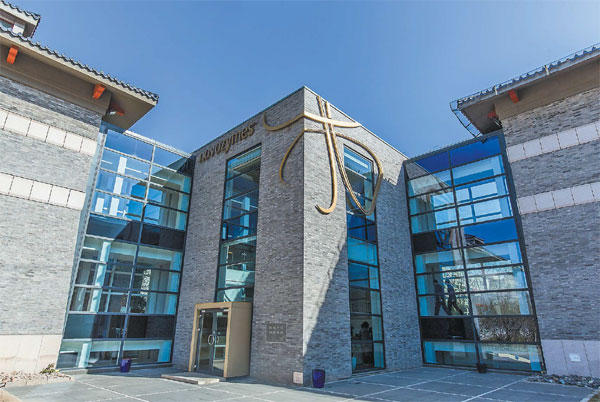Clarion call to masses on biomass

Danish enzyme producer is on a mission to clean up and to educate
Many Chinese farmers have traditionally regarded wheatstraw, cornstalk and other agricultural waste as good only for burning, with the air pollution that this produces. However, Graziela Chaluppe dos Santos Malucelli has other ideas. She has been trying to persuade them that instead they can turn the straw into biomass and thus help to reduce pollution.
That is a solution particularly apt for China, says Graziela, vice-president and Asia-Pacific operations manager for the Danish biotechnology company Novozymes.
| Novozymes' innovation center in Beijing. The Danish company has the most money invested in China. Photos provided to China Daily |
"So we have looked at what kind of biomass there is in China, and what we can do with others to produce value-added products," says Graziela, a Brazilian who has lived in China since 2013.
Novozymes, whose industrial enzyme accounts for 48 percent of the global market share, is the world's largest industrial enzyme maker. In China it has more than half the market, it says.
Novozymes is also the Danish company that has the most money invested in China, the company's second-largest market after North America.
The company says it has invested more than $400 million (364 million euros) in China since 1994, and that sales in the country have grown about 8 percent annually in recent years.
Last year, the company says, it helped eliminate 60 million metric tons of carbon dioxide emissions globally, equal to the carbon emissions produced by 25 million cars in a year.
Novozymes' main activities are biofuel, food and beverages and household care, such as detergents. It also uses raw straw, corn straw and other agricultural residue to produce ethanol, thus reducing dependency on fossil fuels.

Malucelli says each of its ethanol factories can produce 60,000 tons of second-generation ethanol and create 2,000 direct and indirect jobs in rural areas, and will reap 42 million yuan ($6.8 million; 6.2 million euros) a year in selling biomass.
As China's economic growth slows and the economy is transformed into one that is more sustainable, there will be more opportunities for Novozymes, she says.
"There is a lot of discussion about consolidation in industry, and industry is looking for greater productive efficiency and more sustained ways of producing things. That goes hand in glove with what Novozymes does. We provide biological solutions to help our customers save water, energy, agricultural waste and improve their processes. We also have solutions for renewable or green technology for companies as well."
The company has adopted a new strategy for China this year, she says.
"The strategy starts with the idea of togetherness. That means being together with our customers, institutions, governments and academics. It means being together with our partners in searching for solutions. Because the population of the world is growing, there is more demand for food, innovation and sustainability."
The key elements of the strategy, she says, are expanding partnerships in China; continuing to lead with innovation; cultivating talent in China, both local and imported; and educating people about biotechnology.
"We want to promote understanding about biology, and in particular about what our biological technology has to offer the world."
The company's mission is to reach one billion people with its message about the importance of environmental sustainability by 2020, she says.
Novozymes says it invests about 14 percent of its revenue in research and development, which Malucelli says is also important in staying ahead of its rivals in China and elsewhere.
The company employees 1,134 people in China, 200 of them in research and development.
"We need to develop solutions especially for China and address specifically the issues here."
Last year, China's National Development and Reform Commission lauded Novozymes for the example it has set on low-carbon emissions, and in 2009 Forbes magazine had the company on a list of 100 businesses that it reckoned would still exist in 100 years.
The company has factories in Tianjin, Suzhou of Jiangsu province, and Jinan of Shandong province. It has what it calls an innovation center in Beijing, and works with academic institutions in China and elsewhere on research and development. Some of the products it has produced in Beijing have been exported to Europe and the US.
One of the Chinese companies Novozymes works with is Liby Group of Guangzhou, which on May 21 put a new kind of laundry detergent with evity on the market, one that Novozymes had a hand in developing.
"Novozymes and Liby have many common points in terms of its innovation and corporate social responsibility," says Xu Xiaodong, vice-president of Liby, one of the biggest daily chemical enterprises in China.
"Novozymes' biological enzyme is environmentally friendly, and we want to seek sustainability, so our collaboration goes with the trend in the industry. "
Urbanization presents great opportunities to Novozymes, given that cities will need to be developed in a sustainable way, Malucelli says.
"One area of focus for us is the food industry, the aim being to produce less waste in processing food, for example by using less energy.
"As for agriculture, if you use biotechnology together with seeds and plants, you can get higher yields. We have some solutions to protect land against insects or disease, and to produce less waste. We also have ways of making plants grow more efficiently."
As the company grows in China, it needs to find good, reliable partners and to educate people about using biological solutions, she says. Many innovations used elsewhere are just coming into China.
"So our challenge is how to introduce our solutions here, to understand what application they have locally. Sometimes customers are unaware that they can buy products made in a more sustainable way by using biological enzymes, she says, which makes the need for education all the more pressing.
Malucelli says the biggest change she has seen in China over the past few years has been the willingness to innovate, to look for solutions that are appropriate to the country.
"Chinese society is also growing, and people have faced greater exposure to what can be done to improve their lives, for example by being able to buy products that are better. This is driving demand, so companies really need to look for more innovation. They cannot continue with only the solutions they already have."
chenyingqun@chinadaily.com.cn
(China Daily European Weekly 05/29/2015 page23)
Today's Top News
- Japan tempting fate if it interferes in the situation of Taiwan Strait
- Stable trade ties benefit China, US
- Experts advocate increasing scope of BRI to include soft power sectors
- New engine powers cargo drone expansion
- China to boost green industry cooperation
- Manufacturing PMI rises in November































